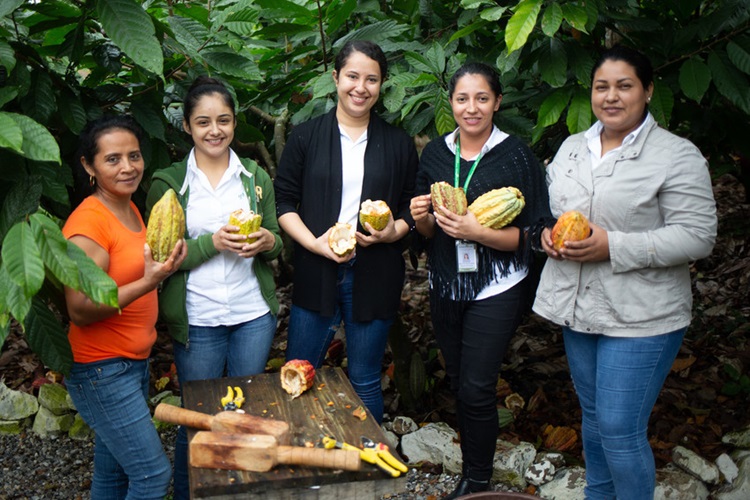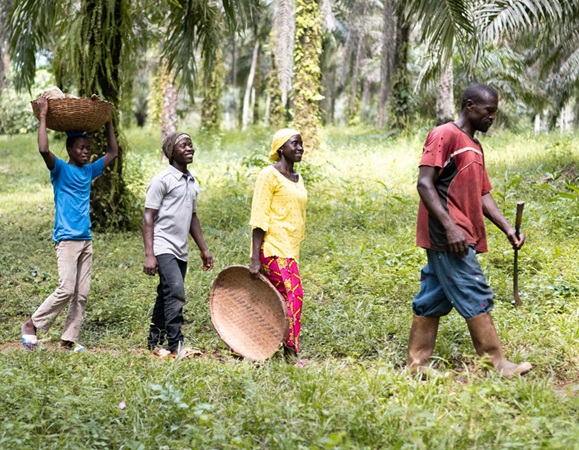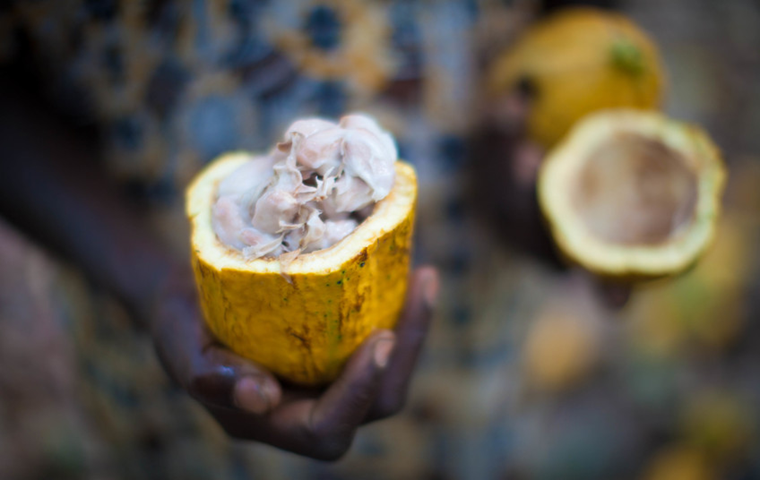by Fairtrade International
Think all chocolate is the same? And what about all the different sustainability labels you find on supermarket shelves? Think again…
If you love chocolate and you want your choices to actually make a difference for farmers, here’s what Fairtrade means – for incomes, empowerment and farmers having control over their own futures.
1. Fairtrade certified farmers are empowered to organise democratically and become more sustainable
Farmer-owned co-operatives are central to Fairtrade. When small farmers join together and organise themselves democratically, they have more resources and more power in trade relationships, ultimately resulting in higher incomes.
The Fairtrade West Africa Cocoa Programme provides training and other services to cocoa co-operatives, to strengthen them as accountable membership organisations and as sustainable business partners. Co-operatives and their farmer members choose to learn more on a range of topics, including governance, financial management, good agricultural practices, occupational health and safety, gender rights, income or crop diversification, and more. Almost nine out of ten co-ops report taking further action on their own, such as rolling out a training for their own members, developing a strategic plan, or strengthening their management systems. Read more about our recent programme monitoring report.
2. Fairtrade guarantees farmers a financial safety net, even when global cocoa prices decrease
We are the only major certification labor that guarantees farmers earn a price that supports costs of sustainable production, and we recently increased our Fairtrade Minimum Price by 20 percent. Farmers can always negotiate and earn more when market prices are higher.
In Côte d’Ivoire, the higher Fairtrade Minimum Price resulted in farmers earning more than $15.1 million more than what they would have with standard prices from October to December 2019 alone. Find out more about the higher Fairtrade Minimum Price for Ivorian cocoa farmers.
3. Fairtrade co-operatives earn a Premium and control it 100%
The mandated Fairtrade Premium for cocoa also increased by 20 percent last year: the highest fixed premium of any major certification. Co-ops are paid the additional Premium amount on top of the Fairtrade Minimum Price, and they decide how to invest it in projects of their choice. In 2018, Fairtrade cocoa co-ops earned more than €44 million in Premium.
What types of things do co-ops spend their Premium on? The biggest categories are investments in the co-ops themselves and services to farmers, including direct cash payments to boost incomes, and procurement of tools and other farm inputs. (Find more cocoa data here.)
Using Fairtrade Premium funds, co-ops can expand their businesses in new directions, and develop their communities. A coffee co-op, COAGRICSAL, in Honduras used their Premium to diversify into cocoa, and build a chocolate factory of their own. A cocoa producer organisation in Côte d’Ivoire was able to install hydraulic water pumps and build new classrooms for their communities – making the farmers benefactors within their communities. What’s most important is that the farmers themselves decide – and benefit.

Find out more about COAGRICSAL co-op’s chocolate factory
Find out more about the use and benefit of Fairtrade Premium
4. Women cocoa farmers are growing as business owners and leaders
The Fairtrade Women’s School of Leadership in Côte d’Ivoire will soon graduate its second cohort of women cocoa farmers – and male allies – who are developing themselves as leaders within their organisations, and realising their own economic empowerment. The year-long programme provides practical training in skills such as finance, negotiation and decision-making, and builds a community of camaraderie and support.
Fairtrade Standards require equal treatment of women and men, and encourage formation of things like Women’s Committees within co-ops to raise up and address the issues that women farmers are facing. Lucia Mansaray, member of Ngoleagorbu cocoa co-op in Sierra Leone, has seen the difference: ‘Women now take part in leadership roles and have key responsibilities. That would never have happened before. We feel more empowered in our community.’ She herself is now the chairperson of her co-op’s Fairtrade Premium Committee.

5. Farmers can make progress toward living incomes
In West Africa, the majority of cocoa farmers still live in poverty, driven by many factors including small farm sizes, low productivity and low global prices. Even Fairtrade farmers are not immune, especially given that many co-ops are only selling a portion of their harvest on Fairtrade terms and earning the accompanying Fairtrade Minimum Price and Premium.
We’re committed to putting the pieces in place that will enable cocoa farmers to earn living incomes. We’ve set Fairtrade Living Income Reference Prices for cocoa in Côte d’Ivoire and Ghana, higher than our Minimum Price, which some companies are voluntarily paying as part of innovative living income pilot projects. We are also working with others to advocate for governments to require companies to take action on living income, such as paying farmers the necessary prices. Read more in our living income progress report.
This year we’re conducting a follow-up study of Ivorian cocoa farming households, three years after our first one (read the first study on cocoa farming income), to find out how farmers are doing now and what actions we need to take moving forward. Together with farmers themselves, chocolate brands, and other sustainability committed partners, we must and will make living incomes the norm, not the exception.
6. There’s a lot of deliciousness to choose from!
Fairtrade certified chocolate producers are found in more than 20 countries, primarily in West Africa but also in the Dominican Republic, Peru, Ecuador and more. The majority of Fairtrade cocoa comes from Côte d’Ivoire (about 80%), while most organic Fairtrade cocoa comes from Latin America. So no matter whether you’re looking for baking chocolate, cocoa power, or specialty origins, the more than 320,000 cocoa farmers represented in the Fairtrade system have you covered.
Chocolate is delicious – but fair and sustainable chocolate tastes so much better. So grab your favourite Fairtrade chocolate today and enjoy!
Find out where to buy Fairtrade chocolate
Want to do more?
Fairtrade is campaigning for a living income to become a reality for cocoa farmers in West Africa.
Read more about the fight for living incomes
The story of chocolate
This film explores the unfairness at the heart of the chocolate industry and how Fairtrade is working towards a living income for cocoa farmers. It specifically focuses on women cocoa farmers in Côte d’Ivoire and the role of women in community development.
